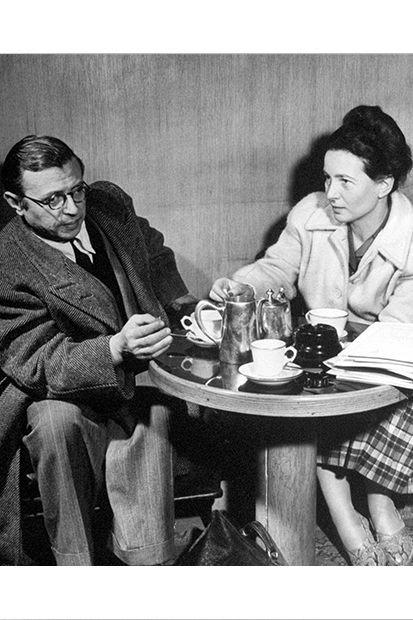Thomas R. Flynn has written an avowedly ‘intellectual biography’ of Jean-Paul Sartre, which might seem fitting. Sartre was nothing if not an intellectual — so much so that one struggles to think of him as anything but an intellectual. Albert Camus, Sartre’s great rival for the title of the 20th century’s most famous thinker, was a strong swimmer and a stronger soccer player. A little adolescent boxing aside, Sartre did little but sit at zinc tables necking coffee and Corydrane (the amphetamine-based painkiller he was addicted to). When, in his magnum opus Being and Nothingness, he called a waiter out for inauthenticity — for refusing his existential duty to define himself in the face of history rather than be moulded by it — he knew something of what he spoke. Sartre spent an awful lot of his life being waited on.
And all the while he was filling notebook after notebook with words (not insignificantly, the title of his first memoir). Like a jobbing hack, he prided himself on the volume of his output. To the disinterested observer, though, it is clear that his productivity had a price. Forever busy with the next deadline, he had no time to reread any of his work, much less polish it for publication. Aesthetic satisfactions aside, this didn’t matter so much with his plays and novels and journalism. But when it came to the philosophy on which Professor Flynn believes Sartre’s reputation rests, it mattered a lot. Nobody said philosophy was meant to be easy, but there is no necessary connection between density of expression and depth of thought.
Early on, Sartre’s prose was merely windy. Here he is in The Imaginary, telling us about something
that aims in its corporality at an absent or nonexistent object, through a physical or psychic content that is given not as itself but in the capacity of an ‘analogical representative’ of the object aimed at.
(Just so you know, he’s defining the ‘image’.) But by the time of Being and Nothingness the verbosity was shading into obscurantism:
The future constitutes the meaning of my present for-itself as the project of its possibility, but that in no way predetermines my for-itself which is to-come, since the for-itself is always abandoned to the nihilating obligation of being the foundation of its nothingness.
(I think this means that tomorrow needn’t be like today if you don’t want it to be.)
But the confusions of Sartre’s sentences were as nothing to the contradictions of his ideas. Like Walt Whitman, he contained multitudes. Unlike Whitman, he was unaware of the fact. From first to last he thought of himself as a Cartesian. But he never explained (neither, more signally, does Flynn) how, from his thirties on, he contrived to stay faithful to Descartes while running around with Marx.
How could he? Nobody — not even someone as clever as Sartre — could marry the Marxian view of history to the Cartesian vision of the singular, sovereign soul. The same goes double for Husserl’s phenomenology (with which Sartre first made a name for himself, pretty much by translating it into French wholesale). Phenomenology, after all, does what the name suggests. It concerns itself not with deep structures but with surface appearances. Marxism, on the other hand, is all hidden meanings, subterranean significances.
What lured Sartre the existential individualist into the straitened precincts of determinism? Bluntly, the thrill of violence — ‘necessary violence’, violence as ‘the midwife of history’, violence that ‘like the spear of Achilles, can heal the wounds that it has made’. Not, Sartre was keen to point out, that he was any kind of Stalinist. He was a thinker, not a thug, and though non-philosophers might not be able to spot the difference, the fact remained that he had arrived at his present revolutionary position ‘arguing on the basis of my principles and not theirs’. So that’s all right then.
Given the Freudian bent of his books on Baudelaire, Mallarmé, Genet, Flaubert (of whom he wrote that ‘everything [of significance in his life] took place in childhood’), it is tempting to ascribe Sartre’s midlife turn to insurrection as a belated response to the odium his 12-year-old self had felt when, a decade after her husband’s death, his mother remarried. This Flynn resists — even though he tells us that Sartre once claimed to have been ‘anti-bourgeois ever since he met his future stepfather’. Fair enough, though fair too, surely, to ask whether we are reading a biography or a critical monograph.
Certainly this bookcan be hard going. You will learn a lot about Sartre’s philosophy — and about continental philosophy in general — but little about the man behind the thought. By the end of page two, the 34-year-old Sartre is readying himself for the second world war. It could be said that since the fundamental premise of existentialism was that activity and actant are inseparable — that to do is to be — a Sartre biography has no need of such information.
It could also be said that a man who advocated violence against ordinary people after having done nothing during the Occupation but kowtow to the enemy was not best placed to talk about either doing or being. Could be, but isn’t — at least not by Flynn, an omission that vitiates his otherwise impressively thoughtful book.






Comments